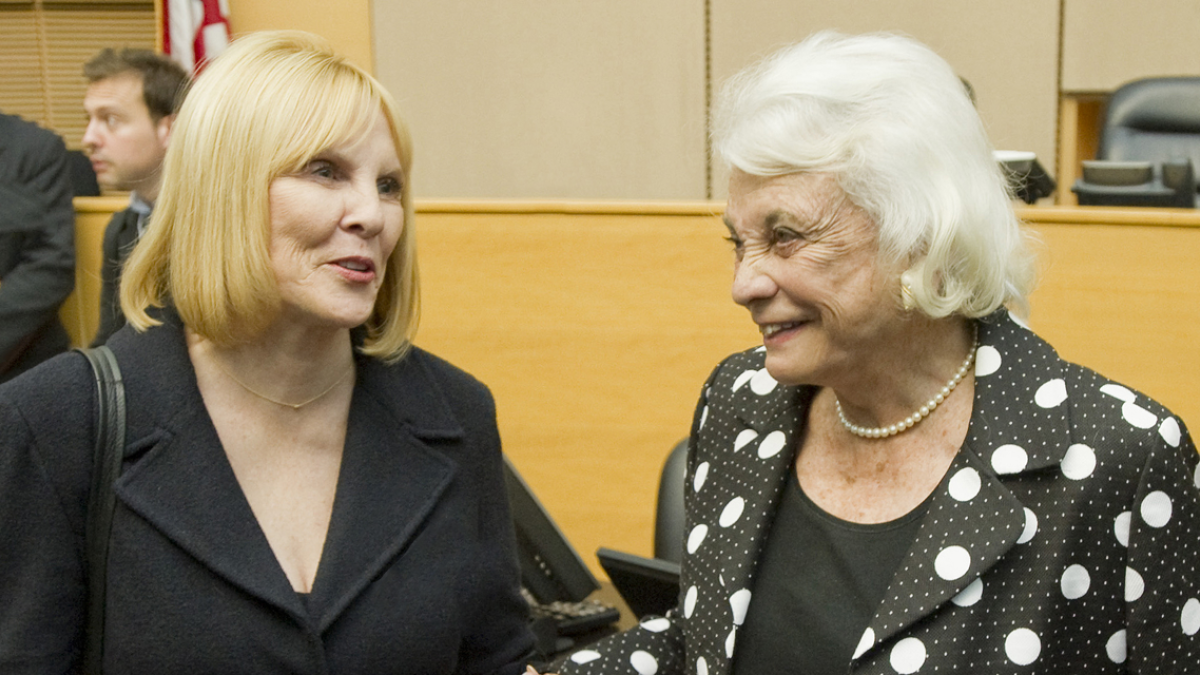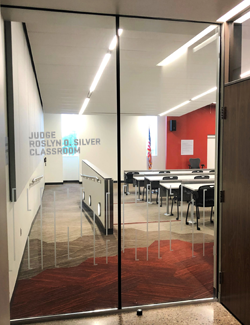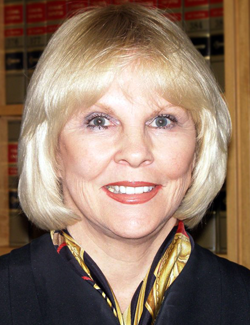Trailblazing federal judge is first ASU Law alumna to have a professorship in her name

Judge Roslyn Silver and Justice Sandra Day O’Connor at the 2013 Neuroscience and the Law Conference.
Judge Roslyn Silver's distinguished career is full of notable firsts. Among other groundbreaking accomplishments, she was the first woman appointed to the Phoenix division of the U.S. District Court, and the district's first female chief judge.
Arizona State University's Sandra Day O'Connor College of Law is naming a professorship in Silver's name, establishing the 1971 graduate of ASU Law as the first alumna to earn such a recognition.
"We are honored to create this professorship, which is the highest academic award that the university can bestow on a faculty member," said ASU Law Dean Douglas Sylvester. "Establishing a new professorship in Judge Silver's name allows us to honor her remarkable career in perpetuity, because the professorship will endure as long as the university exists."
In addition to the creation of The Honorable Roslyn O. Silver Professorship, ASU Law will be naming after Silver a 100-seat classroom space in the school's new downtown Phoenix home, the Beus Center for Law and Society.
Silver, who currently serves as a senior district court judge and teaches at ASU Law, is proud to have been bestowed a professorship at her law school.
"There's no false humility when I say this but I don't need additional recognition," she said. "Rather, what I appreciate today is any recognition I may receive from making a correct and fair decision that is clearly explained. That sounds simple, but it is true. However, I've come to understand that this professorship can serve as an inspiration to law students and help guide them in their careers and this is very meaningful to me."
Early days at ASU Law
ASU Law was a fairly new school when Silver enrolled in 1968, fresh from her undergraduate studies at the University of California, Santa Barbara. Although ASU Law had only been established in 1965, Silver and her father saw eminence in the founding dean, Willard Pedrick.
"My dad was sold on Dean Pedrick," she said. "He had heard him speak and read about him, and told me: 'This is the school for you.' And he was right."
But a half-century ago, the feminist movement was in its embryonic stage, and the world was not as accepting of women in the legal profession. Silver recalls that, because it was unusual for women to attend law school, she had some concerns.
"When I walked into law school, one of the upperclassmen warned me that there were no women's restrooms in the law school," she said, recalling that the student explained she would have to walk across campus to the nearest facility. "And initially I believed him, though he was joking."
She laughs about it now, but says playfully: "You know he better not now appear in my courtroom, that's for sure."
She recalls ASU Law as a welcoming school with progressive views on gender equality. Still, it was not easy to be one of the very few female students.
"The Socratic teaching method was intimidating, and at the outset my best friend and I would try to become invisible in class so as not to be called on, particularly by the dean."
And she was stunned by the sheer number of books, which she says cost more than tuition at that time.
"At first, I thought that plowing through all those books would certainly be no fun, and might take more endurance than I was capable of. But once I began studying the law, I was surprised at how much I enjoyed it and how much it added dimension to my life. Unlike other students, my education to that point had not been specialized in constitutional or legal history. But by the time I graduated, I gained great appreciation for the laws of this country and how fortunate we are to live here with an independent judiciary."
The new law school felt wise beyond its years, she said, and that too was a credit to Dean Pedrick.
"He brought all these illustrious professors with him from all over the United States," she said. "Edward Cleary, Richard Effland, William Canby (now senior U.S. judge of the 9th Circuit Court of Appeals) and Harold Havighurst were highly regarded in their fields. So the law school was new and exciting, with great promise, because of the dean and the distinguished professors."
As she became engaged in the subject matter, she relaxed and had some fun with other students. Of course, students were required to work very hard, but they also occasionally had a good time.
Once, she dressed up as Santa Claus and presented Dean Pedrick, on behalf of the freshman class, with a bicycle in recognition of his fanatical devotion to exercise. On another occasion, she and two other female students wrote a legal-themed song and dance to "Let Me Entertain You,” from the Broadway musical “Gypsy,” titled "Let Me Represent You."
"Our first presentation was at the National Law Professors Association in a huge room with tons of law professors" she said. "And we brought down the house when we belted out: 'Let me represent you. Let me win your case.'"
Some of her fondest memories were working on the law review, first writing articles then editing them. She says she was told by one of her colleagues that he recommended that she be chosen as the editor-in-chief. But one of the professors told him the school was not yet ready for a female editor-in-chief.
She says considering that era it was then understandable.
"And frankly, I was honored to have just been considered for the position."
But once again, she jokingly warned, "That professor had better not wind up in my courtroom."
A trailblazing career
When she graduated from ASU Law, many gender barriers were still in place, especially in the practice of law. But Silver began knocking the barriers down.
She became the first woman to serve as in-house counsel for the Greyhound Armour Dial Corporation. Then, as a trial attorney with the Equal Employment Opportunity Commission, she was one of the first female attorneys. She moved on to a long career with the United States Attorney’s Office, where she was eventually appointed the first female chief of the Phoenix Criminal Division.
In addition to the creation of The Honorable Roslyn O. Silver Professorship, ASU Law will be naming a 100-seat classroom space in her honor. Room rendering above.
A chance meeting a few years after graduation from law school proved inspirational. She was walking to the courthouse in downtown Phoenix when she crossed paths with a judge of the Maricopa County Court — Sandra Day O'Connor. The two struck up a conversation, became acquainted and later friends.
"I knew of her before we met on the street. As a Phoenix native, I became aware of her when she was a senator with the Arizona Legislature," Silver said. "I remember seeing her political signs when she was running for the senate. And my dad would say 'It would be nice if you could someday be a Sandra Day O'Connor.' Really? I couldn't imagine it. Even then, she was larger than life."
By the time they met, O'Connor had already served as an Arizona assistant attorney general and was later the first woman in the United States to serve as a state-level senate majority leader. And in 1981, O'Connor's name was etched in history when she was appointed the first female justice of the Supreme Court.
"She is my hero," Silver said. "She was the first in everything. She was way ahead of every other woman, trailblazing away. So I'm very proud that ASU’s law school is named the Sandra Day O'Connor College of Law."
A trailblazer herself, in 1994 Silver was appointed to the Arizona District Court, as the first woman appointed in the Phoenix division.
On Jan. 8, 2011, a mass shooting outside Tucson left six people dead and then-U.S. Rep. Gabrielle Giffords severely wounded. The then chief judge of the Arizona District Court, John Roll, was one of those killed. By operation of law, Silver then became the chief judge to lead the district in the wake of this tragedy. At the time, the district had the second-largest criminal caseload in the country, requiring that Silver persuade the 9th Circuit to declare a judicial emergency.
It was an emotional and challenging time but there to lend support was O'Connor, who had retired from the Supreme Court as of 2006.
"She became a much closer friend at that time."
Setting a positive example
Silver enjoyed being a trial lawyer at the U.S. attorney’s office and was somewhat concerned that the work as a federal district judge might be monotonous, but not long after her appointment she learned that "it is the best job in the legal profession. Always something new awaits me at the office.
"And it is nice to have a family here. I'm very close to everyone who works for me or with me in the clerk's office. We find time to laugh and have fun in addition to working very hard."
That family includes her beloved dog, who accompanies her to work each day, joyfully bouncing around chambers, surrounded by toys and begging for treats.
Judge Roslyn Silver is the first woman appointed to the Phoenix division of the U.S. District Court, and the district's first female chief judge.
"I originally brought her here because she was just a puppy, and it was impossible to leave her alone," she said. "I thought, you know, it'll just be a few months. Well, here it is 10 years later."
Silver appreciates the example that O'Connor established, helping to open doors for women in the legal profession and judiciary.
"She was a powerful advocate for women, but not inappropriately so," Silver said. "She expected every lawyer, man or woman, to perform well. And that is how she was in the Maricopa County trial court. She was an outstanding jurist and on occasion tough on the lawyers, who then were mostly men. My sense then is that some of them did not appreciate being scolded by a woman, even though they deserved it."
Silver was initially reticent about having a professorship bestowed in her name. But she recognizes the importance of this honor, particularly to the law students. She recalls how few female students there were when she attended law school, a time when she could barely imagine all that she has accomplished today, including presiding over some of the most significant federal cases.
"After all, just as Justice O'Connor did for me, I have come to realize the power of setting a positive example for all law students, including now the many women attending ASU Law. And for those yearning to connect with a lawyer or judge, I'll be here for them."
The Honorable Roslyn O. Silver will be recognized as the 2019 Alumni Service Award recipient at ASU Law’s seventh annual Gold ’n Gavel Auction and Reception on Friday, Nov. 15, 2019.
More Law, journalism and politics

Exhibit uses rare memorabilia to illustrate evolution of US presidential campaigns
After one of the most contentious elections in history, a new museum exhibit offers a historical perspective on the centuries-old…

TechTainment conference explores the crossroads of law, technology, entertainment
What protections do writers, actors, producers and others have from AI? Will changing laws around name, image and likeness (…

How to watch an election
Every election night, adrenaline pumps through newsrooms across the country as journalists take the pulse of democracy. We…

